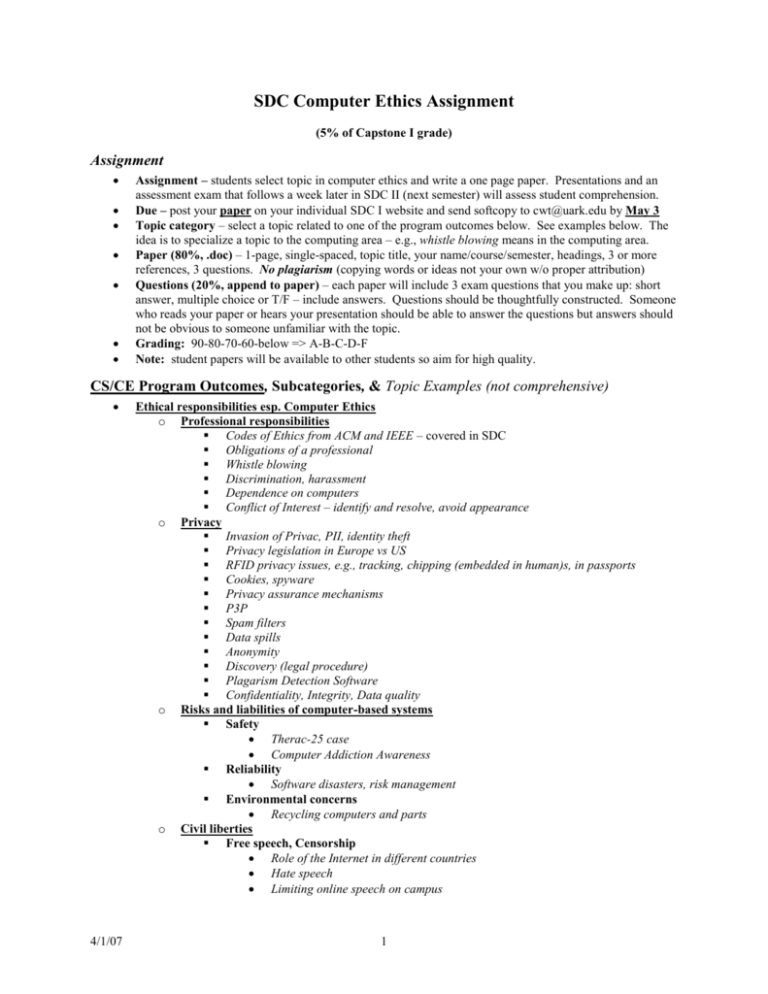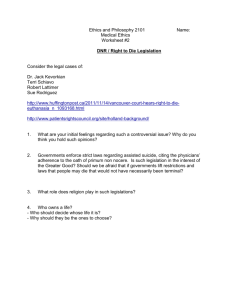Computer Ethics Assignment: Topics & Guidelines
advertisement

SDC Computer Ethics Assignment (5% of Capstone I grade) Assignment Assignment – students select topic in computer ethics and write a one page paper. Presentations and an assessment exam that follows a week later in SDC II (next semester) will assess student comprehension. Due – post your paper on your individual SDC I website and send softcopy to cwt@uark.edu by May 3 Topic category – select a topic related to one of the program outcomes below. See examples below. The idea is to specialize a topic to the computing area – e.g., whistle blowing means in the computing area. Paper (80%, .doc) – 1-page, single-spaced, topic title, your name/course/semester, headings, 3 or more references, 3 questions. No plagiarism (copying words or ideas not your own w/o proper attribution) Questions (20%, append to paper) – each paper will include 3 exam questions that you make up: short answer, multiple choice or T/F – include answers. Questions should be thoughtfully constructed. Someone who reads your paper or hears your presentation should be able to answer the questions but answers should not be obvious to someone unfamiliar with the topic. Grading: 90-80-70-60-below => A-B-C-D-F Note: student papers will be available to other students so aim for high quality. CS/CE Program Outcomes, Subcategories, & Topic Examples (not comprehensive) 4/1/07 Ethical responsibilities esp. Computer Ethics o Professional responsibilities Codes of Ethics from ACM and IEEE – covered in SDC Obligations of a professional Whistle blowing Discrimination, harassment Dependence on computers Conflict of Interest – identify and resolve, avoid appearance o Privacy Invasion of Privac, PII, identity theft Privacy legislation in Europe vs US RFID privacy issues, e.g., tracking, chipping (embedded in human)s, in passports Cookies, spyware Privacy assurance mechanisms P3P Spam filters Data spills Anonymity Discovery (legal procedure) Plagarism Detection Software Confidentiality, Integrity, Data quality o Risks and liabilities of computer-based systems Safety Therac-25 case Computer Addiction Awareness Reliability Software disasters, risk management Environmental concerns Recycling computers and parts o Civil liberties Free speech, Censorship Role of the Internet in different countries Hate speech Limiting online speech on campus 1 o o o Communications Decency Act Encryption controversy Big Brother Video surveillance Corporations monitoring employee email and web usage Need to know => need to share Intellectual property Software, music, … piracy Patent process including provisional patents, infringement Patenting business methods Copyright and Freedom of Expression Fair use Digital rights management The David LaMacchia Case Use of personally owned software on company computers Ethical issues in AI, DBMS, Software Engineering, … Introductory programming Freedom of speech Exploring Computer Security Networking Networked world Web browsers and security issues Viruses, worms Distance learning Netiquette Software Engineering Software maintainability Designing safety critical system Ethical implications of inaccurate simulations Operating systems Introduction to Hacking and Cracking Operating system security through design Human Computer Interfaces Ethics in Ergonomics Helping People With Disabilities to Use Their Computers Database Management Data Mining and Statistical Inference Artificial Intelligence Turing test Application areas Daily life Medical information systems Electronic government including Voting Information warfare Resources – many more are available at the library or online 4/1/07 Books on Computer Ethics o R. Spinello, Cyberethics: Morality and Law in Cyberspace, Jones and Bartlett, 2006 o G. Stamatellos, Computer Ethics: A Global Perspective, Jones and Bartlett Publishers, 2007 o Search on Amazon for “computer ethics” o K. Himma, Internet Security: Hacking, Counterhacking, and Society, Jones and Bartlett Publishers, 2007 Websites on Computer Ethics – search online for “computer ethics” o http://en.wikipedia.org/wiki/Computer_ethics 2 o o o o o o o o o o o o o o o o o o o o o o 4/1/07 http://plato.stanford.edu/entries/ethics-computer/ http://www.onlineethics.org/topics/comethics.html http://www-swiss.ai.mit.edu/6095/readings-crime.html#cases http://www.npr.org/templates/story/story.php?storyId=4464216 http://ethics.sandiego.edu/Applied/Computing/index.asp http://www.comphist.org/computing_history/new_page_5.htm http://compserv.uark.edu/policies/ http://www.sigcse.org/cc2001/SP.html http://www.apa.udel.edu/apa/archive/newsletters/v97n2/computers/tavani.asp http://homepage.mac.com/planclos/ethics/index.html http://www.aaai.org/AITopics/html/ethics.html http://cyberethics.cbi.msstate.edu/biblio/ http://cyberethics.cbi.msstate.edu/ http://www.rivier.edu/faculty/htavani/biblio.htm http://www.cpsr.org/ http://ieeexplore.ieee.org/xpl/freeabs_all.jsp?arnumber=644928 http://www.acm.org/constitution/code.html http://www.emr.org/linksUCE.html http://www.stanford.edu/class/cs201/ http://computingcases.org/ http://www2.okbu.edu/business/faculty/chanchey/ethicsurls.htm http://www.cs.sunysb.edu/ProfessionalEthics.html 3







